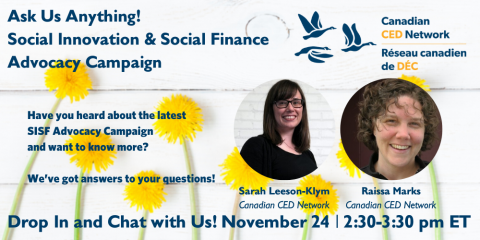Ask Us Anything! Social Innovation & Social Finance Advocacy Campaign
11:30 am - 12:30 pm Pacific
12:30-1:30 pm Mountain
1:30-2:30 pm Central
2:30-3:30 pm Eastern
4:30-5:30 pm Atlantic
5:00-6:00 pm Newfoundland
Have you heard about the latest SISF Advocacy Campaign, but don’t know much about it? Wondering where it came from and why? Do you want to have your voice heard but are not sure how? Or maybe you’re just wondering what all the fuss is about a Social Innovation and Social Finance Strategy for Canada.
We’ve got answers to your questions!
Drop in for a virtual chat with Raissa & Sarah on Tuesday, November 24 any time between 2:30-3:30 pm Eastern time. You can join for just a couple of minutes or hang out for longer.
Raissa Marks and Sarah Leeson-Klym both work at CCEDNet; Raissa is the Government Relations Director and Sarah is the Regional Networks Director.
Join Zoom Meeting
https://us02web.zoom.us/j/89348719613?pwd=SjFoemtrZlROYlY1VnQwbWpzTnJJUT09
Meeting ID: 893 4871 9613
Passcode: 127839
Dial by your location
+1 438 809 7799 Canada
+1 587 328 1099 Canada
+1 647 374 4685 Canada
+1 647 558 0588 Canada
+1 778 907 2071 Canada
+1 204 272 7920 Canada
Meeting ID: 893 4871 9613
Find your local number: https://us02web.zoom.us/u/kAOcXlplF


 Kyle White is the Governance and Education Lead with Co-operatives First. His work focuses on developing and delivering educational and development services for Co-operatives First. Originally from Newfoundland and Labrador, Kyle has worked his way across Canada focusing on community economic development in rural and Indigenous communities. With degrees in Geography and Public Policy, Kyle’s educational background has focused on community development, governance, and organizational policy. Aside from his work with Co-operatives First, Kyle is an active volunteer with several Saskatoon-based non-profits and serves on a variety of boards.
Kyle White is the Governance and Education Lead with Co-operatives First. His work focuses on developing and delivering educational and development services for Co-operatives First. Originally from Newfoundland and Labrador, Kyle has worked his way across Canada focusing on community economic development in rural and Indigenous communities. With degrees in Geography and Public Policy, Kyle’s educational background has focused on community development, governance, and organizational policy. Aside from his work with Co-operatives First, Kyle is an active volunteer with several Saskatoon-based non-profits and serves on a variety of boards. Dr. Alex Wilson, Opaskwayak Cree Nation, is a professor with the Department of Educational Foundations and the Academic Director of the Aboriginal Education Research Centre at the University of Saskatchewan. Her teaching and research focuses on Indigenous land-based education, Queering education and land protection through sustainable housing.
Dr. Alex Wilson, Opaskwayak Cree Nation, is a professor with the Department of Educational Foundations and the Academic Director of the Aboriginal Education Research Centre at the University of Saskatchewan. Her teaching and research focuses on Indigenous land-based education, Queering education and land protection through sustainable housing.
